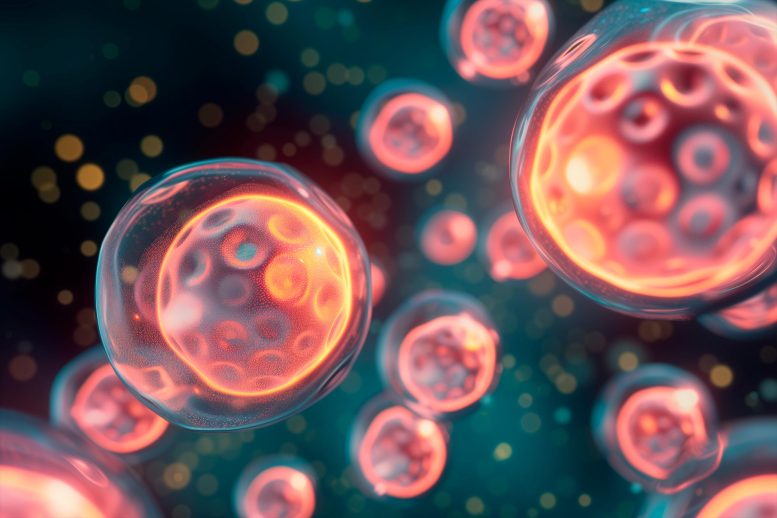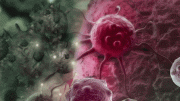
Groundbreaking research reveals that 7-dehydrocholesterol (7-DHC) serves as an antioxidant, protecting cells from ferroptosis. This challenges prior assumptions about 7-DHC and could significantly impact cancer treatment and our understanding of related diseases. Credit: SciTechDaily.com
Recent research shows that 7-dehydrocholesterol is an antioxidant that protects cells from ferroptosis, offering new avenues for cancer treatment and disease understanding.
In a groundbreaking study, a team led by Würzburg Professor José Pedro Friedmann Angeli has shown that the cholesterol precursor 7-dehydrocholesterol (7-DHC) plays a crucial role as an antioxidant: it integrates into the cell membranes and protects the cells by preventing a certain type of cell death, known as ferroptosis.
“Until now, the accumulation of 7-DHC was only associated to neurodevelopmental defects, now we show that it actually increases cellular fitness and could promote a more aggressive behavior in cancers such as Burkitt’s lymphoma and neuroblastoma,” says Friedmann Angeli.
The newly discovered protective function of 7-DHC opens up exciting prospects for further improving the treatment of cancer and other diseases associated with ferroptosis: “It gives us new opportunities to test potential inhibitors that target cholesterol biosynthesis and are already established in medical practice.”
Teams From Würzburg, Dresden, Munich and Heidelberg Involved
The researchers report this in the journal Nature. In addition to the Würzburg team from the Rudolf Virchow Zentrum – Center for Integrative and Translational Bioimaging, the following scientists contributed to the study: Dr. Maria Fedorova (Dresden University of Technology), Marcus Conrad (Helmholtz Munich), Derek Pratt (University of Ottawa), and Andreas Trumpp and Hamed Alborzinia (German Cancer Research Center, DKFZ Heidelberg).
Observing Changes in 7-DHC Levels
High cholesterol levels are associated with health problems such as heart disease and diabetes. Most studies focus on how cholesterol contributes directly to these diseases.
In this area, the discovery of the cholesterol precursor 7-DHC as an antioxidant opens up new possibilities: Studies on changes in 7-DHC levels could provide crucial new insights into the diseases. In addition, drugs that specifically block 7-DHC production should be researched in combination with other drugs — this could have a positive effect in the treatment of some cancers.
Possible Effects on Tumour Development
“Our next research goal is to investigate the effects of 7-DHC accumulation during tumor development,” says Würzburg ferroptosis expert José Pedro Friedmann Angeli.
The team responsible for the publication in Nature also calls for further epidemiological studies. Background: There are drugs authorized by the US Food and Drug Administration (FDA) that can inhibit the DHCR7 enzyme. These include trazodone, which is prescribed around 20 million times a year in the USA, sometimes even for off-label use to treat insomnia.
“Studies have shown that people taking this drug have elevated plasma levels of 7-DHC. Epidemiological studies are crucial to better understand possible effects here,” says Friedmann Angeli. These studies would help to find out whether there is a connection between patient groups who regularly take ferroptosis-modulating drugs such as trazodone and cancer incidence, the occurrence of metastases, or other critical aspects of public health.
Reference: “7-Dehydrocholesterol is an endogenous suppressor of ferroptosis” by Florencio Porto Freitas, Hamed Alborzinia, Ancély Ferreira dos Santos, Palina Nepachalovich, Lohans Pedrera, Omkar Zilka, Alex Inague, Corinna Klein, Nesrine Aroua, Kamini Kaushal, Bettina Kast, Svenja M. Lorenz, Viktoria Kunz, Helene Nehring, Thamara N. Xavier da Silva, Zhiyi Chen, Sena Atici, Sebastian G. Doll, Emily L. Schaefer, Ifedapo Ekpo, Werner Schmitz, Aline Horling, Peter Imming, Sayuri Miyamoto, Ann M. Wehman, Thiago C. Genaro-Mattos, Karoly Mirnics, Lokender Kumar, Judith Klein-Seetharaman, Svenja Meierjohann, Isabel Weigand, Matthias Kroiss, Georg W. Bornkamm, Fernando Gomes, Luis Eduardo Soares Netto, Manjima B. Sathian, David B. Konrad, Douglas F. Covey, Bernhard Michalke, Kurt Bommert, Ralf C. Bargou, Ana Garcia-Saez, Derek A. Pratt, Maria Fedorova, Andreas Trumpp, Marcus Conrad and José Pedro Friedmann Angeli, 31 January 2024, Nature.
DOI: 10.1038/s41586-023-06878-9









Promising perspectives.